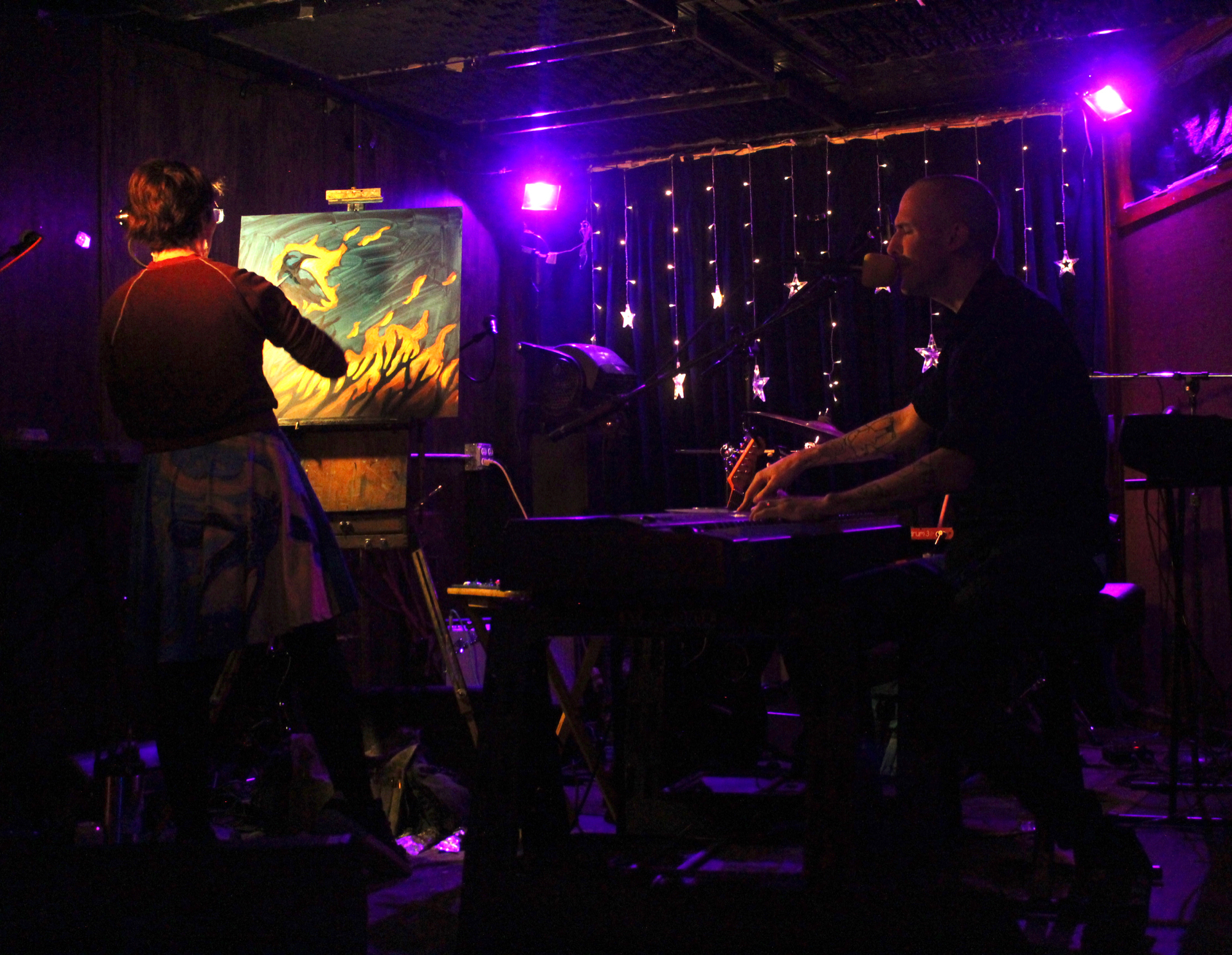
Brian Slattery Photos
Pocket Vinyl.
Eric Stevenson leaned hard over the piano, his arms spread like wings, his hands like spiders. Intricate figures of notes poured from his fingers, and he sang in a high clear voice, as unironically advertised, about “defiant hope.” Nearby, her back turned to the audience but her work plain to see, Elizabeth Jancewicz deftly began with a blank canvas and began painting a bird in woods. Then she set it all on fire. The people in the audience sat in near-complete silence, giving the music and the artwork all their attention. It was that kind of night at Cafe Nine, one in which the crowd gave the musicians free rein of the room, and got, in return, a show of rare intimacy.
The night began with the New Haven-based S.G. Carlson, doing a now-unusual solo set, as he himself commented early in his hour. “I’m in a band called the Tines,” he said, “but tonight you get just one Tine. Thanks to Bombadil for letting me borrow their capo.”
It turned out that one Tine was all the evening required. A conversation toward the back of the room quieted down two songs into Carlson’s set and the club — with a good-sized crowd in it — stayed that way for the rest of the evening, giving each song big applause and then returning to undivided attention. This let Carlson deliver relaxed, haunting versions of his full-band songs. The hour seemed suddenly later in the best possible sense when Carlson described one song as evoking, for him, the feeling of finishing a show and stopping on the way home for a late-night coffee to stay awake on the drive home.
“There’s nobody else around and there’s something lovely about it,” he said. Which brought him to introducing the next band, Pocket Vinyl, who he estimated was on gig number 995 since starting out as a band (Pocket Vinyl is about to celebrate its 1,000th gig with a show in its hometown of Norwich). “Which, if my math is right,” Carlson added, “means about 995 late-night coffees.”
The duo of Pocket Vinyl then quickly took the stage, Stevenson almost immediately engaging in banter with the crowd while Jancewicz silently got down to the business of painting. As Stevenson explained, he would play seven songs. In that time, Jancewicz would complete an original painting. At the end of the show, that painting would be auctioned off to the highest bidder.
“We’re going to play songs about defiant hope,” Stevenson said. “A few songs about death. Maybe a couple non-sexy songs about sex.” With a twinkle in his eye, he continued. “I don’t mean to spoil things, but we’re a really good band. Fantastic!” The audience laughed. “And now that expectations are set high, the chances of failure are that much higher — which is exciting!”
Stevenson ripped into his first song as Jancewicz darkened the canvas with quick brush strokes and then began laying out the image. Stevenson proved to be a dynamic performer, amply filling the club with piano and voice as he sang two anthemic songs in a row, redolent of that promised defiant hope. The audience answered with rowdy applause, and then was silent
“Look at you, looking at us, paying attention!” Stevenson said. For Stevenson, that meant a chance to switch gears to suddenly quieter material, because, as he put it, “what is our relationship if we’re not challenging each other?” The audience laughed again. He explained that he’d perform two songs back to back. “I’ll give you a signal when it’s clap time.”
Stevenson was obviously joking when he exclaimed that Pocket Vinyl was a really good band, but on Wednesday night the combination of Stevenson’s music and Jancewicz’s art did indeed prove mesmerizing. Stevenson took a moment for humility. “I know you’re a mixed crowd, but if this is the attention you always bring, let’s tour together,” he said. “You can tell I like attention, and this filling my cup right up!” By the end of the set there was a keen sense of camaraderie in the air.
“I did not intend to form a community,” Stevenson sang in one of the songs, “I had no idea who shared this frequency.” On Wednesday night, everyone did.
The room was thus not so much warmed up as it was laser-focused for Bombadil, stalwarts of the indie folk scene from Durham, N.C. Set up in an unusual configuration, facing one another on the stage, the quartet — Daniel Michalak, James Phillips, Stacy Harden, and MK Rodenbough — easily moved through a set of originals while the audience drank each one in, washing each down with a round of applause. Bombadil’s music is deceptively simple. They don’t write songs with many parts to them, and infuse them with elliptical lyrics, giving each number a sense of possibility, time after time. About halfway through the set, the band began to open up, telling a story that was like the music being played. Before performing a short a cappella number from the British Isles, Phillips explained that he had once been in a club in Germany — “a lot like this place,” he added — and ended up singing the song with the bartender there, who was Scottish. After they were done, “I looked up and tears were pouring out of his eyes onto his motorcycle jacket. It was really something.”
The delivery and the reception lended the story the vibe of a koan. Some meaning was being conveyed. The audience might not have been able to articulate it, but it was felt, in the silence before the next song.